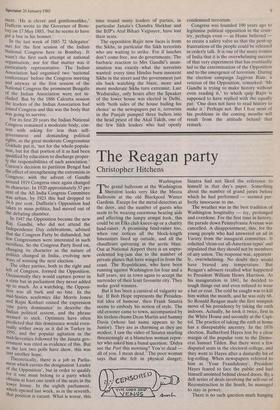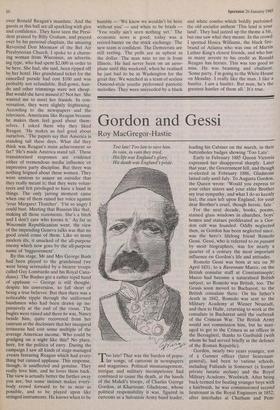The Reagan party
Christopher Hitchens
Washington he grand ballroom at the Washington 1 Sheraton looks very like the Mecca Ballroom at the old Blackpool Winter Gardens. Except for the metal-detectors at the door, and the number of guests who seem to be wearing enormous hearing aids and affecting the lumpy armpit look, this could be an Elks club knees-up or a charity fund-raiser. A promising fund-raiser too, when one notices all the block-length limousines lined up outside, and all the chauffeurs quivering in the arctic blast. Out at National Airport there is an unpre- cedented log-jam due to the number of private planes that have winged in from the coast. The Republicans, who have been running against Washington for four and a half years, are in town again to accept the surrender of their least favourite city. They make good winners.
But it has been a carnival of vulgarity so far. If Bob Hope represents the Presiden- tial idea of humour, then Frank Sinatra seems to embody his notion of style. The old crooner came to town, accompanied by his tireless chums Dean Martin and Sammy Davis (whose last name appears to be Junior). They are as charming as they are modest. I saw the video of Sinatra snarling threateningly at a blameless woman repor- ter who asked him a banal question: Didya see the Post this morning? You're dead all of you. I mean dead.' The poor woman says that she felt in physical danger;
Sinatra had not liked the reference to himself in that day's paper. Something about the number of grand juries before which he had performed — seemed per- fectly innocuous to me.
The weather was in the best tradition of Washington hospitality — icy, prolonged and overdone. For the first time in history, the parade down Pennsylvania Avenue was cancelled. A disappointment, this, for the young people who had answered an ad in Variety from the inaugural committee. It solicited `clean-cut all-American types' and stipulated that they should not be members of any union. The response was, apparent- ly, overwhelming. No doubt they would have braved any temperature. But Reagan's advisers recalled what happened to President William Henry Harrison. At his inauguration in 1841, he decided to tough things out and even refused to wear a hat or coat. The cold he caught was to kill him within the month, and he was only 68. So Ronald Reagan made the first wimpish move of his presidency by taking the oath indoors. Actually, he took it twice, first in the White House and secondly at the Capi- tol. The practice of taking the oath at home has a disreputable ancestry. In the 1876 election, Rutherford Hayes lost by a clear margin of the popular vote to the Demo- crat Samuel Tilden. But there were a few disputed seats in the electoral college, and they went to Hayes after a dastardly bit of log-rolling. When newspapers referred to him as 'Your Fraudulency', President Hayes feared to face the public and had himself anointed behind closed doors. By a deft series of deals involving the sell-out of Reconstruction in the South, he managed to stay in power.
There is no such question mark hanging over Ronald Reagan's mandate. And the guests at this ball are all sparkling with glee and confidence. They have seen the Presi- dent praised by Billy Graham, and prayed over by his personal chaplain, the amazing Reverend Don Moomaw of the Bel Air Presbyterian Church. I spoke to a charm- ing woman from Wisconsin, an advertis- ing type, who had spent $2,000 in order to be here. She had, she said, been ripped off by her hotel. Her grandstand ticket for the cancelled parade had cost $100 and was probably not refundable. Ball-gown, hair- do and other trimmings were not cheap. But would she have missed it? Not her. She wanted me to meet her friends. In con- versation, they were slightly frightening. According to the newspapers and the television, Americans like Reagan because he makes them feel good about them- selves. I asked them why they liked Reagan. 'He makes us feel good about ourselves.' The papers say that America is standing tall these days. What did they think was Reagan's main achievement so far? `He's made America stand tall.' These transistorised responses are evidence either of tremendous media influence or impressive party discipline. But there was nothing feigned about these women. They were anxious to assure an outsider that they really meant it; that they were volun- teers and felt privileged to have a hand in things. The only jarring moment came when one of them raised her voice against `your Margaret Thatcher'. 'I'm so angry I could bust. Meeting that Russian like that, making all those statements. She's a bitch and I don't care who knows it.' As far as Wisconsin Republicanism went, the view of the impending Geneva talks was that no good could come of them. Like so many modern ills, it smacked of the all-purpose enemy which now goes by the all-purpose name of `bigguvermene.
By this stage, Mr and Mrs George Bush had been played to the grandstand (we were being serenaded by a bizarre troupe called Guy Lombardo and his Royal Cana- dians). The Bushes got a rather tepid hand of applause — George is still thought, despite his conversion, to fall short of being a true believer. But then there was a noticeable ripple through the uniformed bandsmen who had been drawn up im- pressively at the end of the room. The bugles were raised and there he was, Nancy beside him, quite recovered from her tantrum at the disclosure that her inaugural trousseau had cost some multiple of the average American income. Who could be grudging on a night like this? No place, here, for the politics of envy. During the campaign I saw all kinds of stage-managed events featuring Reagan which had every- thing but canned applause. This response, though, is unaffected and genuine. They really love him, and he loves them back. The view is actually better the farther away you are, but some instinct makes every- body crowd forward to be as near as possible, and to be played upon like stringed instruments. He knows when to be humble — 'We know we wouldn't be here without you' — and when to be brash 'You really ain't seen nothing yet.' The economic news is good; today was a record-buster on the stock exchange. The new team is confident. The Democrats are still reeling. The polls are as upbeat as the dollar. The man next to me is from Illinois. He had never been on an aero- plane until this weekend, when he realised he just had to be in Washington for the great day. We watched as a team of sexless Osmond-style youths performed patriotic melodies. They were succeeded by a black and white combo which boldly purloined the old socialist anthem 'This land is your land'. They had jazzed up the theme a bit, but one saw what they meant. In the crowd I spotted Hosea Williams, the black fire- brand of Atlanta who was one of Martin Luther King's closest friends, and who has as many arrests to his credit as Ronald Reagan has horses. This was too good to miss. He was beaming and ebullient. `Some party. I'm going to the White House on Monday. I really like the man. I like a hustler. I am a hustler. But man, he's the greatest hustler of them all.' It's true.











































 Previous page
Previous page